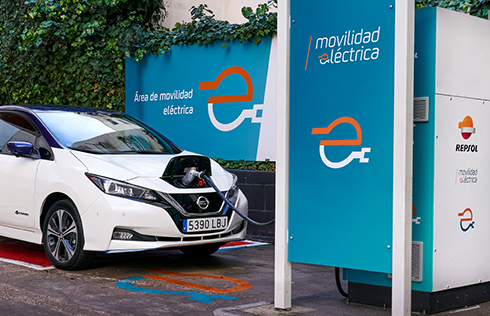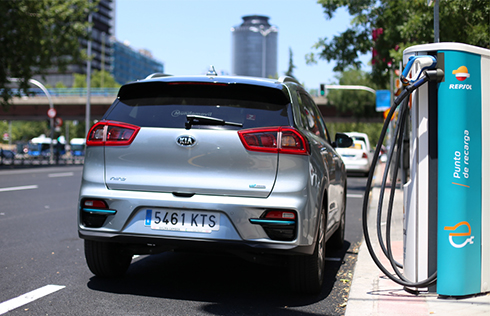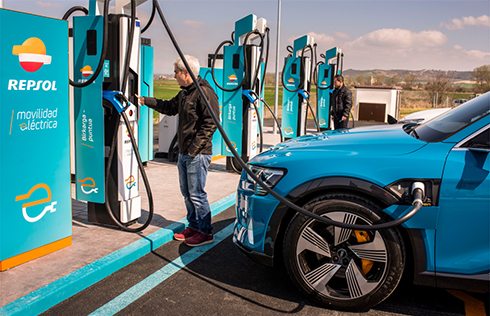A comprehensive solution in electric mobility
The recent agreement reached with Nissan, a world leader in electric vehicle manufacturing, to continue expanding its charging network in Spain is one more step in the consolidation of Repsol's multi-energy offering in sustainable mobility. The company now has one of the most important charging networks for electric mobility in Spain, with more than 300 points in public places.
“Repsol can offer a comprehensive solution for electric vehicle users, supplying 100% renewable energy. We supply this not just in private homes and businesses, where there are more than 1,000 terminals already installed, but also through a powerful public network, with charging points in service stations, shopping malls, on public roads, and in other locations. Over the next few years, Repsol plans to have more than 1,000 publicly accessible charging stations distributed throughout Spain. This means that the company will have these facilities along all the country's main road travel corridors,” says Carlos Bermúdez, Electric Mobility retail manager at Repsol.
Charging for all kinds of use
Repsol has defined a plan for its electric mobility business “involving the increase of private installation customers, which includes private residences and businesses, as well as the development of our public charging network,” relying on its capillary network of more than 3,300 service stations. “Our aim is for electric vehicle users to be able to move with peace of mind and comfortably throughout Spain thanks to our network of charging points,” Bermúdez continues.
Repsol’s service for private residences and workplaces includes turnkey installation of the terminal in individual, resident community, or company parking garages, power supply and additional services such as maintenance, in addition to “substantial charging discounts in our public network for our home electricity customers.”
Repsol began its journey in electric mobility with the creation of the company IBIL in 2010, together with the Basque regional government’s Energy Agency (EVE) that holds a 50% stake. In 2018, with the purchase of Viesgo, “we became a power retailer, another milestone for rolling out our comprehensive charging solutions for electric vehicles.” And at the end of 2019, the energy company acquired IBIL's commercial branch, which includes its charging network: “Repsol is now developing the commercial side of electric mobility, but, from a corporate point of view, our stake in IBIL has not changed. We continue to hold 50% in the company, which acts as our supplier and technological consultant. This is fundamental as it guarantees that all our charging points have a very high technological and innovative component.”

As part of this technological collaboration and the application of circular economy criteria, Repsol and IBIL have developed the first public access facility in Spain that includes energy storage for electric vehicle charging. This innovative system, situated at the Repsol service station in Tolosa (in the northern Spanish province of Guipúzcoa), uses recycled electric bus batteries. This facilitates and economizes the installation of charging infrastructure in places without access to an electric grid with sufficient power.
Collaboration to widen the network
With the common interest in developing the charging infrastructure, “it is a priority for us to reach alliances with strategic partners such as vehicle manufacturers, large corporations, vehicle lease companies, and government agencies.” Within this framework, the agreement with Nissan foresees, in the first phase, the joint deployment of 15 fast-charging points at Repsol service stations distributed throughout Spain. They will have a capacity of 50 kW and, depending on the electric vehicle battery size, will allow a charge time of around 30 minutes. These 15 fast-charging points will be added to the 70 that the energy group currently has operating.
Repsol also maintains an alliance with the Kia Group, “a brand with very ambitious plans to make its entire line of vehicles electric.” This deal includes Repsol charging services at Kia’s dealerships as the preferred solution for its 100% electric and plug-in hybrid vehicles. Furthermore, both companies joined forces in 2018 in the field of new forms of mobility through the joint carsharing venture WiBLE. With a fleet of 500 Kia Niro PHEV vehicles, WiBLE has reached 200,000 users in two years and has surpassed 1.4 million trips.
The company has also signed agreements with government agencies to develop its network along public roads with the city councils of Zaragoza, Santander, and Madrid (the city where Repsol has 12 fast-charging points in locations such as Paseo de la Castellana and Puerta de Alcalá), as well as with the island councils of Fuerteventura and Lanzarote and several administrations in the Basque Country region. Moreover, it has announced a collaboration protocol with the Guardia Civil police force which includes the possibility of the installation of charging infrastructures to promote a more sustainable mobility.
Furthermore, Repsol has reached collaboration agreements for the installation of charging points with several companies. Among others, it has agreed the installation of points for electric vehicles of Asisa's medical services; for Condis’ last-mile delivery vans, and for Ricoh vehicles. These agreements strengthen Repsol's strategy to serve the professional sector, which has great expansion potential thanks to the expansion and renewal of fleets.

Electricity only 100% renewable
Repsol's 2021–2025 Strategic Plan, focused on the commitment to becoming a net zero emissions company by 2050, has strengthened its commitment to low-carbon initiatives, to which 30% of investments in the period will be allocated. Repsol now only provides 100% renewable electricity at its electric vehicle charging points. “This is very important because if we want this form of mobility to contribute to the fight against climate change and be an alternative that helps decarbonize transport, the energy has to come from 100% renewable sources. Otherwise, we would just be displacing CO2 emissions.”
Digitalization plays a decisive role in this Repsol business, with the Waylet app as a central tool. It facilitates customer's relationship with the service by locating the closest charging point, activating the charging, and paying for it comfortably. Through Waylet, customers can also access smart charging terminals that Repsol has available for the home or business, as well as consult their consumption, manage their energy use, start or stop wireless charging, etc. These terminals are monitored from a control center that allows for a large part of the possible maintenance incidents to be solved remotely.
The market share of electric vehicles in Spain is still small, “although demand is increasing and in 2020 close to 60,000 pure and plug-in hybrid electric vehicles were registered, almost doubling the existing fleet in a year.” Amongst the causes for this still limited market share, an inferior charging infrastructure compared to other European countries is often cited. “It is true that we have to continue advancing in the deployment, but we also have a clear deficit in that this infrastructure isn't fully professionalized in Spain. A professionalization is crucial and involves taking into account customer needs, adapting the type of infrastructure to their needs, installing the technology in strategic locations (such as service stations located in travel corridors), as well as guaranteeing users that the facilities are accessible and operational 24/7 and that they are equipped with auxiliary services (restrooms, restaurants, etc.) that are correctly maintained, etc.”
Ultra-fast charging along major travel corridors
To promote this form of mobility beyond the urban environment, “it is also key to have a design as a country for setting up ultra-fast charging points that are located strategically along the main travel corridors.” This technology allows the batteries from electric vehicles that support this to be charged in five to 10 minutes, matching the duration of electric charging with conventional fuel refueling. Repsol is taking steps in this direction with facilities of this type in operation at the Lopidana service stations (in the northern Spanish province of Álava), located on the N-I highway, and Ugaldebieta (in the northern Spanish province of Vizcaya), on the A-8 highway. Both have four charging points with these characteristics. Additionally, Repsol has taken part in several Expressions of Interest (EOIs) related to Electric Mobility projects in the Recovery, Transformation, and Resilience Plan, for example, related to fast or ultra-fast charging infrastructure corridors. Moreover, the company has recently launched its first ultra-fast charging point in Portugal.

Both the Spanish government's Climate Change and Energy Transition bill as well as the plans announced by the different electric charging operators foresee a massive deployment of charging points in the next few years. Repsol will also join this effort, “although we think that this expansion must be done by following criteria of efficient and smart network development, for example, by considering the distance between points to guarantee capillarity and coverage of the whole country, thus ensuring the energy supply for electric vehicle users. For that reason, our intention is to develop a capillary network with a fast-charging point for every 30 miles (50 kilometers) along the major roads and travel corridors and complement that network with ultra-fast charging points in strategic locations.”
Repsol is working on electric mobility within the framework of its commitment to a multi-energy model as the most robust way to decarbonize transport. “All of the energy alternatives for mobility that favor the reduction of emissions and contribute to the fight against climate change have to be taken into account. A combination of solutions must be used,” integrating electrification with the use of low-carbon or hydrogen fuels “by using the alternative that best adapts to customer needs and different uses,” Bermúdez concludes.
